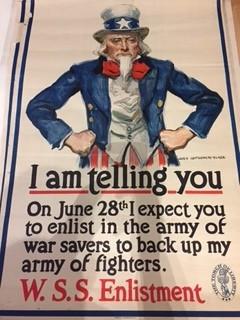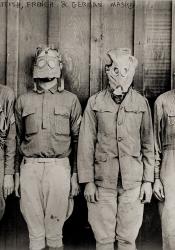Dulce et Decorum Est, Wilfred Owen
Bent double, like old beggars under sacks,
Knock-kneed, coughing like hags, we cursed through sludge,
Till on the haunting flares we turned our backs,
And towards our distant rest began to trudge.
Men marched asleep. Many had lost their boots,
But limped on, blood-shod. All went lame; all blind;
Drunk with fatigue; deaf even to the hoots
Of gas-shells dropping softly behind.
Gas! GAS! Quick, boys!—An ecstasy of fumbling
Fitting the clumsy helmets just in time,
But someone still was yelling out and stumbling
And flound’ring like a man in fire or lime.—
Dim through the misty panes and thick green light,
As under a green sea, I saw him drowning.
In all my dreams before my helpless sight,
He plunges at me, guttering, choking, drowning.
If in some smothering dreams, you too could pace
Behind the wagon that we flung him in,
And watch the white eyes writhing in his face,
His hanging face, like a devil’s sick of sin;
If you could hear, at every jolt, the blood
Come gargling from the froth-corrupted lungs,
Obscene as cancer, bitter as the cud
Of vile, incurable sores on innocent tongues,—
My friend, you would not tell with such high zest
To children ardent for some desperate glory,
The old Lie: Dulce et decorum est
Pro patria more. (Owen, 1917).
The poem, "Dulce et Decorum Est" by Wilfred Owen was written as a response to pro-war poems during World War I. Owen is largely equated to Britain’s greatest war poet. His overall goal with his work was to tell the truth about war and the sadness that entails it (The British Library). Owen was killed in action at the age of 25, one week before the Armistice. Only five poems were published in his lifetime—three in the Nation and two that appeared anonymously in the Hydra, a journal he edited in 1917 when he was a patient at Craiglockhart War Hospital in Edinburgh. Shortly after his death, seven more of his poems appeared in the 1919 volume of Edith Sitwell's annual anthology, Wheels: a volume dedicated to his memory, and in 1919 and 1920 seven other poems appeared in periodicals (Poetry Foundation).
Owen makes readers aware of the atrocities that wars are responsible for. The words "Dulce et Decorum Est" are the words "it is sweet and fitting" in Latin. It is followed by "pro patria mori", which means "to die for one's country." Owen makes readers aware that this Latin saying is a lie. His work can be compared to the journal of the Irish soldier, George Blennie, who documents his time during the Irish Rebellion of 1798 as barbaric. Blennie went on to write about the Irish soldiers who had their foreskins forcibly removed. Owen refers to similar horrendous experiences such as incurable sores on tongues, blood gargling from one’s lungs, and men choking and drowning in gas. Gas was a popular weapon used in war from 1914 onwards. The gas injured the soldiers horrendously and left some with permanent disabilities. Some records declare that soldiers could suffer the injuries for up to four months before dying (The British Library).
Throughout the poem, Owen is expressing his concern with toxic patriotism. He is warning readers that those who go to war in order to “fight for their country” are not ready for the horrible disasters they will witness. The idea of risking people's lives for the country in which one resides is a consequence of the toxic patriot mindset. This mindset has been modeled throughout history, leading up to the U.S. Capitol riot conducted by Trump supporters. During Trump's speech before the Capitol riot, Trump encouraged his supporters to incite violence. During the speech he stated, "And we fight. We fight like hell. And if you don't fight like hell, you're not going to have a country anymore," towards the end of the speech Trump stated, "The Democrats are hopeless — they never vote for anything. Not even one vote. But we're going to try and give our Republicans, the weak ones because the strong ones don't need any of our help. We're going to try and give them the kind of pride and boldness that they need to take back our country" (B. Naylor, 2021). Trump's speech is similar to the political propaganda distributed during World War I. Pictured below is an original World War I poster depicting an Uncle Sam figure that states, "I am telling you on June 28th I expect you to enlist in the army of war savers to back up my army of fighters" (J. M. Flagg, 1918). These political figures encouraging citizens to "fight for their country" fuels the toxic patriot mindset that has lead to the death of billions throughout history.

Works Cited:
Dulce et decorum est - synopsis and commentary. (n.d.). Crossref-It.Info. Retrieved April 30, 2022, from https://crossref-it.info/textguide/wilfred-owen-selected-poems/
I am telling you on June 28th I expect you to enlist in the army of war savers to back up my army of fighters. (n.d.). [Posters]. https://jstor.org/stable/community.28272648
Naylor, B. (2021, February 10). Read Trump’s Jan. 6 speech, a key part of impeachment trial. NPR. Retrieved May 1, 2022, from https://choice.npr.org/index.html?origin=https://www.npr.org/2021/02/10/966396848/read-trumps-jan-6-speech-a-key-part-of-impeachment-trial
Poetry Foundation. (1921). Dulce et decorum est by Wilfred Owen. Retrieved April 30, 2022, from https://www.poetryfoundation.org/poems/46560/dulce-et-decorum-est
Wilfred Owen. (n.d.). The British Library. Retrieved April 30, 2022, from https://www.bl.uk/people/wilfred-owen

